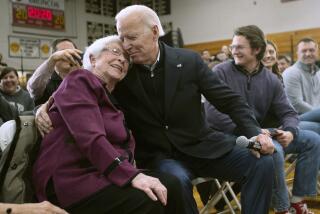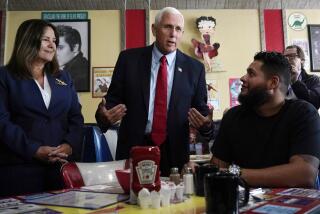Clinton Says ‘Diversions’ Obscure Issues : Democrats: He claims focus on his personal life blocks a serious discussion. Tsongas emphasizes image as candidate of candor.
- Share via
MANCHESTER, N.H. — Arkansas Gov. Bill Clinton opened the last week of the New Hampshire primary campaign Monday by accusing unidentified Republicans of trying to destroy his presidential campaign with “a bizarre series of diversions” designed to block discussion of the nation’s economic problems.
Hours later, former Massachusetts Sen. Paul E. Tsongas, who is now in a virtual tie in public opinion polls in the state with Clinton, delivered a speech laying out the themes that will guide his final push.
In unusually emotional and intimate terms, Tsongas tied his basic campaign themes to his recovery from cancer. “I believe my survival carries with it an obligation,” Tsongas told a large crowd in a downtown theater here. His “purpose” he said, is to “tell the hard truth about what our country faces.”
The two statements outlined the choice that Clinton and Tsongas plan to offer voters. Clinton and his aides are pressing what polls show as his greatest advantage--voters’ belief that he can do something about the economic problems that beset them--while Tsongas emphasizes that he is the candidate of candor.
“I have only one horse to ride--truth,” Tsongas tells voters. “If I give that up, I’m just a Greek from Massachusetts who has had cancer.”
The theme plays to Tsongas’ strength, the notion that he is not just another pretty-faced politician. But it also subtly emphasizes Clinton’s weakness--voters’ questions about whether he can be trusted.
Monday, Clinton met with a group of homeowners and business people facing foreclosure. As television cameras recorded their tales, he outlined a three-part economic “lifeline” plan to help those in economic distress. The plan centers on changing federal banking regulations to extend credit to families and small businesses caught in the downward spiral of the recession.
“This is a very big election,” he told them, adding that the contest will determine “whether the country can maintain its economic leadership.”
Clinton returned to New Hampshire after a weekend of meetings with aides in Little Rock. With his wife, Hillary, standing next to him, Clinton insisted the unproven tabloid stories about his personal life “don’t have anything to do with the hopes and dreams or the crises and fears of the people of New Hampshire or this country.
“For too much of the last couple of weeks, this election has been about me, or rather about some false and twisted tabloid version of me when it should have been about the people of this state,” he said, vowing to “fight like hell” to keep attention on this state’s economic difficulties.
Although he chided Democrats who have “joined in” with personal attacks, Clinton focused on what he called a Republican-generated attempt to ruin his candidacy with “the kind of search and destroy politics that have taken the very heart out of the political system of this country.”
The “Republican attack machine,” he said, specializes in the tactic of “define and destroy before people really get to know the candidate.” The machine turned on him as soon as he emerged as a potential Democratic front-runner, he said.
Clinton’s impassioned statement could work to shift attention away from the personal stories about him. But he faces several problems. First, Clinton conceded that the story which has caused him the most trouble lately--questions about whether he misled his draft board in the late 1960s--was a “legitimate” issue. He once again insisted he had done nothing wrong. Second, Clinton offered no evidence of national GOP involvement in the stories about him, instead challenging reporters to investigate the question and adding what he described as a Southern saying: “When you find a turtle on a fence post, he didn’t get there by accident.”
Reporters in Arkansas have found evidence that some Arkansas Republicans have helped spread some of the stories about Clinton that continue to appear in supermarket tabloids, but links between the national GOP and the stories have remained speculative.
As the two leaders in the polls laid out their campaign themes--and attracted the majority of attention, other candidates continued to look for an opening wedge.
Iowa Sen. Tom Harkin spent the day in his home state awaiting the results from Democratic precinct caucuses, which his aides have hoped would provide him a boost here. Nebraska Sen. Bob Kerrey appeared at an economically hard-hit lumberyard near here and brushed off his low standing in the polls. “I feel very comfortable with where we are right now,” he said.
More to Read
Get the L.A. Times Politics newsletter
Deeply reported insights into legislation, politics and policy from Sacramento, Washington and beyond. In your inbox twice per week.
You may occasionally receive promotional content from the Los Angeles Times.











